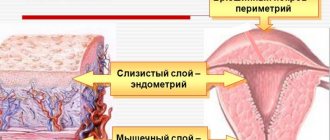The onset of pregnancy can be considered successful from the moment when the fertilized egg attaches to the endometrium - the mucous layer lining the uterus from the inside.
Normal development of the fetus is possible only in the uterine cavity, therefore, if the embryo attaches outside this organ, the pregnancy becomes pathological and must be terminated to save the woman’s life.
The presence of this dangerous complication must be detected as early as possible. For this purpose, a beta-hCG test is used. The progress of hCG production during ectopic pregnancy significantly lags behind the growth of this parameter during normal gestation.
Causes of ectopic pregnancy
The embryonic membrane produces the hormone human chorionic gonadotropin.
The growth dynamics of this indicator determine the development of pregnancy. HCG during an ectopic pregnancy increases slowly; a month after fertilization of the egg, the production of the hormone stops completely.
The hormone content is checked in the blood and urine.
Reasons for ectopic embryo implantation:
- infectious and inflammatory diseases of the pelvic organs;
- hormonal imbalance;
- abortions;
- previous difficult childbirth.
All of the above factors disrupt the patency of the fallopian tubes. They form adhesions that prevent the embryo from moving into the uterus.
98 out of 100 cases of ectopic pregnancies occur in the fallopian tubes. The embryo can attach to the abdominal wall, rudimentary uterine horn, or ovary.
Timely diagnosis of pathology is extremely important. The fetus is doomed to death. Its implantation in abnormal places and subsequent development cause internal bleeding. A woman's life is at risk.
Signs of pathology
All the signs of pregnancy are present - changes in eating habits, increased sense of smell, nausea.
There is a delay in the menstrual cycle. The pregnancy test shows two lines. Here you need to pay attention - the second stripe is usually pale and not clearly defined. This is due to the slow growth of hCG during ectopic pregnancy.
The reason for the sluggish increase in hormone concentration is the pathological development of pregnancy.
A normal developing pregnancy is not accompanied by painful sensations. With an ectopic, women experience pain in the lower abdomen and lower back.
The pain is cramping, cutting, pulling. Defecation and urination are accompanied by painful sensations. Bloody discharge may occur.
Bleeding is usually scanty, similar to menstruation, but lasts longer. Uterine bleeding occurs quite rarely.
If there are symptoms of ectopic pregnancy, hCG is determined. The absence of dynamics indicates pathology.
A sharp pallor of the skin, a drop in blood pressure, nausea, and fainting are signs of internal bleeding. The patient is subject to urgent hospitalization.
To confirm internal bleeding, a puncture of the posterior vaginal fornix is performed.
Sharp pain in the vagina during a gynecological examination means that the fallopian tube has ruptured.
After examination, the doctor makes a diagnosis based on hCG growth data and ultrasound results.
What are the hCG indicators for other pathologies?
In some situations, there is a change in the concentration of hCG up or down from the norm. A decrease in hormone levels, in addition to ectopic pregnancy, can be an indicator of such pathological conditions as:
- intrauterine growth retardation;
- non-developing pregnancy;
- placental insufficiency.
An increase in concentration that does not correspond to the norm occurs when:
An analysis of hCG levels is a research method that suggests pregnancy. In order to accurately diagnose VD, it is necessary to conduct an additional set of studies.
When should you test for hCG?
Chorionic gonadotropin is not determined before the menstrual cycle is delayed.
It begins to be produced a week after conception. At this time, only a blood test can determine the presence of the hormone. Two weeks after fertilization, hCG can be detected in urine using a test strip.
In the absence of regular menstruation and warning symptoms, women usually test for the concentration of hCG in the urine.
The absence of a second stripe or a barely visible stripe means that the hormone is being produced slowly.
This is a feature of the pathology. HCG during an ectopic pregnancy does not rise as quickly as during a healthy one.
It is best to consult a doctor. After a gynecological examination, the doctor will order a blood test for hCG. Prescribe an ultrasound examination.
What does a high hCG level mean?
Elevated levels of human chorionic gonadotropin in the early stages may indicate a multiple pregnancy. This picture is also observed in women suffering from diabetes and severe attacks of toxicosis.
In the 2nd trimester, high hCG levels may indicate that the child will be born with Down syndrome. But, of course, in this situation, a comprehensive examination of the expectant mother is required, since it is wrong to draw such conclusions based on only one analysis.
At the end of the 3rd trimester, high hCG values that differ from the norm signal that the pregnancy is overdue and that the child is suffering.
Thus, we can conclude that increased hCG levels are observed under the following conditions:
- multiple pregnancy;
- post-term pregnancy;
- early toxicosis, gestosis;
- discrepancy between the true gestational age and the expected one;
- diabetes mellitus in a woman;
- chromosomal abnormalities in the fetus - congenital malformations, Down syndrome, etc.;
- taking gestagens of synthetic origin (hCG levels increase not only in non-pregnant women, but also in men);
- hydatidiform mole;
- neoplasms in the kidneys, uterus, lungs and other organs;
- testicular teratoma in men;
- chorionic carcinoma;
- recent abortion (4-5 days ago);
- taking medications containing human chorionic gonadotropin, for example, in preparation for IVF.
Is it possible to detect an ectopic pregnancy using hCG? Yes, with a high degree of probability. But it is necessary to confirm this diagnosis in conjunction with an ultrasound examination.
How does the hCG level increase and does it increase at all during an ectopic pregnancy? There is practically no growth dynamics, unlike normal pregnancy. Knowing how to determine an ectopic pregnancy by hCG from the 2nd week of conception can significantly facilitate the diagnosis of this condition. Thanks to this, there is a high chance of responding to a woman’s problem in a timely manner, providing her with adequate assistance, preventing complications that threaten her health and life.
Author: Olga Rogozhkina, doctor, especially for Mama66.ru
Types of tests to determine hCG levels
In order to confirm or refute ectopic implantation, laboratory tests of blood and urine are performed. HCG for ectopic pregnancy in the early stages approximately corresponds to similar indicators for progressive pregnancy.
At home, every woman can test using a test strip. The result of this test is not 100% reliable.
If a woman has kidney disease, cardiovascular disease, or drank a lot of liquid the day before the test, the test will show a false negative result.
A positive result confirms the presence of pregnancy, but does not determine whether it is normal or not.
Whether hCG will show an ectopic pregnancy depends on the type and method of research. More information (in comparison with a test) about the development of pregnancy will be provided by a blood test from a vein. The doctor orders hCG detection at intervals of two days.
A total of 3-4 analyzes are carried out. But if the symptoms are appropriate and the hormone level is low during the first study, one is enough.
Other symptoms
Since a weak increase in hCG during this period may indicate not only an ectopic pregnancy, but also other pathologies of bearing a child, you need to know other symptoms of this condition. Their presence will confirm doubts, and their absence will give hope that the suspicions were in vain. Signs of an ectopic pregnancy, in addition to a slow rise in hCG levels, include:
- scanty bleeding of unknown origin instead of regular menstruation;
- pulling, very painful sensations in the abdomen, closer to its lower part;
- deterioration of well-being: dizziness, rapid fatigue, sudden mood swings, drowsiness (or vice versa - insomnia), loss of appetite, decreased performance - in a normal pregnancy in the early stages, all these symptoms are not yet so pronounced, but an ectopic one is different in that it gives know about yourself in this way;
- if the period is already long, regular loss of consciousness, elevated temperature, and fever are possible.
So a low level of hCG during an ectopic pregnancy is far from the only symptom of this dangerous condition. If a woman listens carefully and sensitively to her own body, she will suspect something is wrong already in the first weeks. This could be a real salvation for her. If this pathology is diagnosed in a timely manner, termination of pregnancy can be carried out medically. But the longer the period, the greater the risk of rupture of the fallopian tube, which can be fatal. In this case, a decision is made about surgical treatment.
HCG norms and their dynamics by week
During normal course, the concentration of hCG in the blood doubles at certain intervals.
In the first days after conception, the hormone doubles every two days. From the sixth week, doubling occurs after 3 days. After seven weeks of pregnancy - every 4 days.
The maximum concentration is observed at 10 weeks. Then there is a gradual decline. Subsequent values are about a tenth of the peak value.
HCG levels during an ectopic pregnancy do not change as intensely from week to week as during a healthy pregnancy.
The rapid growth of the chorion in the first weeks is explained by hormonal changes in the body, fetal development and the formation of the placenta.
After 10 weeks, the placenta functions as a respiratory and nutritional organ for the fetus. Using the data in the table, you can see what level of hCG is possible during an ectopic pregnancy.
Features of the pathology
Timely detection of decreased hCG levels during ectopic pregnancy allows the doctor to navigate the current situation and make the only right decision. After all, this condition is a real tragedy for any woman for the following reasons.
- Firstly, there is not the slightest chance of saving the child.
- Secondly, not only the health, but also the life of the woman is in danger at this moment. The ectopic (fallopian) tube, where the fertilized egg is often implanted, can rupture at any time and cause not only bleeding and severe pain, but also death.
- Thirdly, in the future, full conception becomes problematic. Read more about planning a pregnancy after an ectopic pregnancy.
- Fourthly, this is a very insidious and dangerous condition because in the first months it proceeds exactly the same as a normal pregnancy. And this is where an hCG analysis comes to the rescue during an ectopic pregnancy, which will show deviations from the norm and allow immediate medical surgery to be carried out in time.
Blood and urine tests show insufficient levels of hCG during an ectopic pregnancy, since the cells of the chorion (the membrane of the embryo) begin to produce this hormone in small quantities compared to the norm in this position. Why is this happening?
Changes in indicators during ectopic pregnancy
The level of hCG during ectopic pregnancy varies quite widely from week to week. Much depends on the individual characteristics of the woman and the accuracy of determining the date of conception.
Approximate indicators can be approximately tracked using the hCG table for ectopic pregnancy.
HCG for ectopic pregnancy. Table
| Cycle day (counted from the first day of menstruation) | Gestation period from conception (in days) | HCG, (IU/l) |
| 26-28 | 12-14 | from 0 to 100 |
| 28-30 | 14-16 | 101-200 |
| 30-32 | 16-18 | 201-1000 |
| 32-34 | 18-20 | 1040-3750 |
| 34-36 | 20-22 | 1950-6550 |
| 36-38 | 22-24 | 3400-10800 |
| 38-40 | 24-26 | 5700-17050 |
| 40-42 | 26-28 | 9050-23350 |
| 42-44 | 28-30 | 11250-30900 |
| 44-46 | 30-32 | 16650-43250 |
| 46-48 | 32-34 | 25550-57650 |
| 49-50 | 34-36 | 31700-73300 |
| 50-52 | 36-38 | 40700-88800 |
| 52-54 | 38-40 | 49800-102550 |
| 54-56 | 40-42 | 58200-112900 |
An ectopic pregnancy based on hCG levels is defined as the difference between the values for a successful pregnancy and an abnormal one. Only blood test readings are taken into account.
It is very important to correctly determine the period, because hormone levels are tied to it. Counted from the expected date of conception.
Using data on the concentration of human chorionic gonadotropin for a normal pregnancy, it should be taken into account that a deviation from the norm of 20% is quite acceptable.
Attention! Deviations greater than 50% are considered pathology.
HCG level for suspected ectopic pregnancy by week
Ectopic pregnancy and hCG levels
Accurate studies and calculations of hormone levels by week give you the opportunity to determine your pregnancy and its course. If you notice any abnormalities, you need to urgently contact a gynecologist for medical help.
A visit to the gynecologist at the first signs of ectopic pregnancy is mandatory
It is better to count the amount of hormones from the second or third week after your last menstruation, that is, in the second week of pregnancy. Based on the table of hCG levels for normal and abnormal pregnancies, draw the right conclusions.
HCG level during observation of pregnancy without pathologies by week
| 1 - 2 weeks | 20 — 150 |
| 2 - 3 week | 100 — 4880 |
| 3 - 4 weeks | 1120 — 31400 |
| 4 - 5 weeks | 2550 — 82400 |
| 5 - 6 weeks | 23200 — 151100 |
| 6 - 7 weeks | 27400 — 233100 |
| 7 - 11 weeks | 20800 — 291100 |
| 11 - 16 weeks | 6150 — 103100 |
| 16 - 21 weeks | 4730 — 80200 |
| 21 - 39 weeks | 2500 — … |
Estimated hCG level for specific weeks when an ectopic pregnancy is detected
| 1 - 2 weeks | 0 — 100 |
| 2 weeks | 100 — 200 |
| 2 - 3 weeks | 200 — 1000 |
| 3 weeks | 1050 — 3760 |
| 3 - 4 weeks | 3400 — 5680 |
| 4 weeks | 9050 — 23340 |
| 4 – 5 weeks | 16650 — 43220 |
| 5 weeks | 40700 — 88790 |
| 5 - 6 weeks | 49810 — 102540 |
| 6 weeks | 64600 — 116310 |
If the doctor does not have any special recommendations for immediately detecting pregnancy, you need to take a repeat blood test and determine the presence or absence of any pathologies in the fetus. In this case, the hCG analysis will make it clear that the hormone human chorionic gonadotropin is manifested in the patient, but significantly below the required norm at the very period when it should be much higher.
Blood test for chromosomal pathology
Video - When to take an hCG test
HCG consists of:
- alpha particles;
- beta particles.
They are inimitable and unique in their internal structure. Only thanks to the beta unit is the state of a woman’s pregnancy accurately diagnosed at the time of her test. The exact level of beta hCG particles, if it is below the expected norm, indicates a disastrous diagnosis.
hCG analysis
How to get tested correctly. Preparation
The analysis is carried out on an empty stomach, preferably in the morning.
A time period of 10-12 hours must be maintained from the last meal to the analysis. During this period, you cannot drink tea or coffee, but water is allowed.
A few days before the study, avoid drinking alcohol, fatty, smoked, and spice-rich foods. Refrain from stress, emotional stress, heavy physical activity, and sexual intercourse.
If a repeat examination is required, it is carried out at the same time and in the same clinic. To maintain the same research error.
When studying hCG in urine, do not drink a lot of liquid the day before. The test is carried out in the morning, when the chorion concentration is highest.
What else can a weak increase in hCG indicate?
Human chorionic gonadotropin informs about fetal development. Low levels of the hormone during pregnancy mean that the pregnancy is proceeding with abnormalities. This may be intrauterine death of the fetus, malformations, or arrest of development.
The woman is prescribed an additional ultrasound examination, and the uterus is cleaned according to indications. In the early stages, hCG levels drop before spontaneous miscarriage.
If the increase in hCG in the early stages was normal, but then decreased, this may be a signal not only of an ectopic pregnancy, but also of termination of pregnancy due to hormonal imbalance.
A decrease in the concentration of human chorionic gonadotropin means:
- ectopic pregnancy;
- intrauterine fetal death;
- post-term pregnancy;
- fetal freezing;
- placental insufficiency.
A low level does not always mean pathology. The reason may be incorrect determination of the date of conception due to late ovulation.
Some diseases of the kidneys and cardiovascular system cause a downward error.
Author: Irina Petrovna, obstetrician Specially for the site kakrodit.ru
HCG for frozen pregnancy in the early stages
Instrumental diagnosis of the pathology is complicated by the fact that the child’s heartbeat cannot yet be heard. Laboratory diagnosis of the patient’s hormonal status is considered a reliable method. However, a one-time study is not enough. The doctor will prescribe the test again and track the value of chorionic hormone over time, at least three times.
The hCG value during a frozen pregnancy does not increase or begins to fall sharply. The rate of decrease in the indicator is not a standard parameter; it largely depends on the individual characteristics of the patient. The woman notes the absence of signs of toxicosis, weakness, swelling, nausea and vomiting, feverish symptoms, pain in the lower abdomen, increased fatigue and bloody vaginal discharge.
The low level of hCG during a frozen pregnancy is explained by intrauterine fetal death. The exact causes of this pathological condition remain unknown. As a rule, they are caused by the presence of infections, endocrine pathologies, genetic abnormalities, etc.
After a miscarriage or spontaneous abortion, you should undergo a comprehensive examination, including genetic tests. If necessary, the doctor will select a treatment, after which the likelihood of bearing and giving birth to a healthy baby will increase.
Can an hCG test be wrong during a frozen pregnancy? If the rules of preanalytical preparation, as well as the collection and storage of the studied biomaterial are strictly followed, the possibility of error is excluded.











